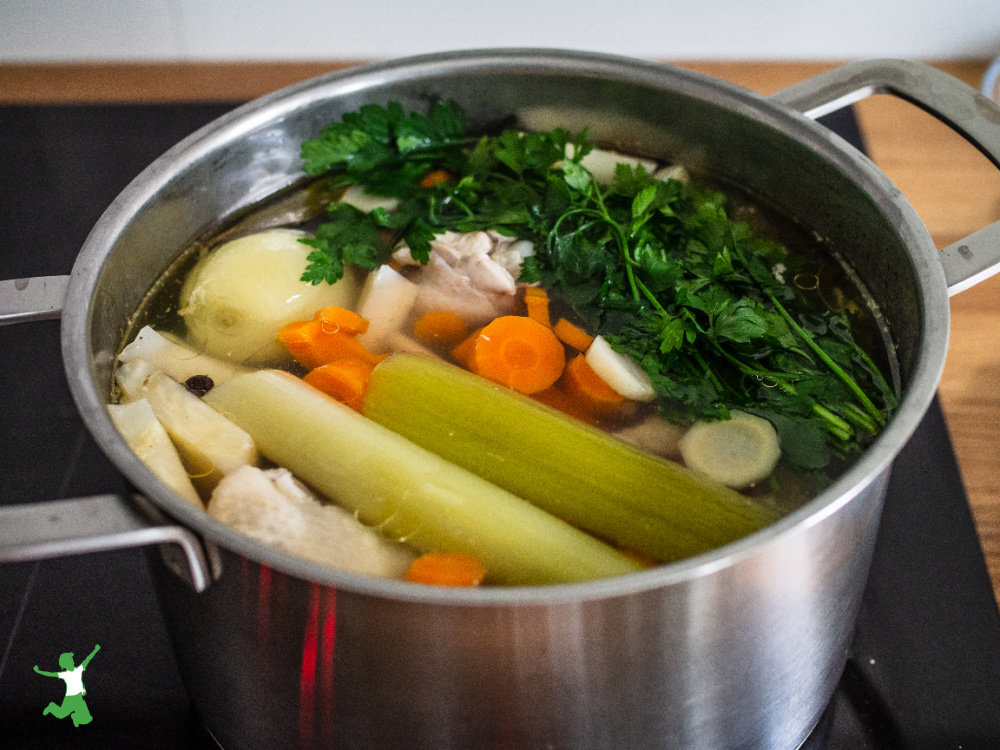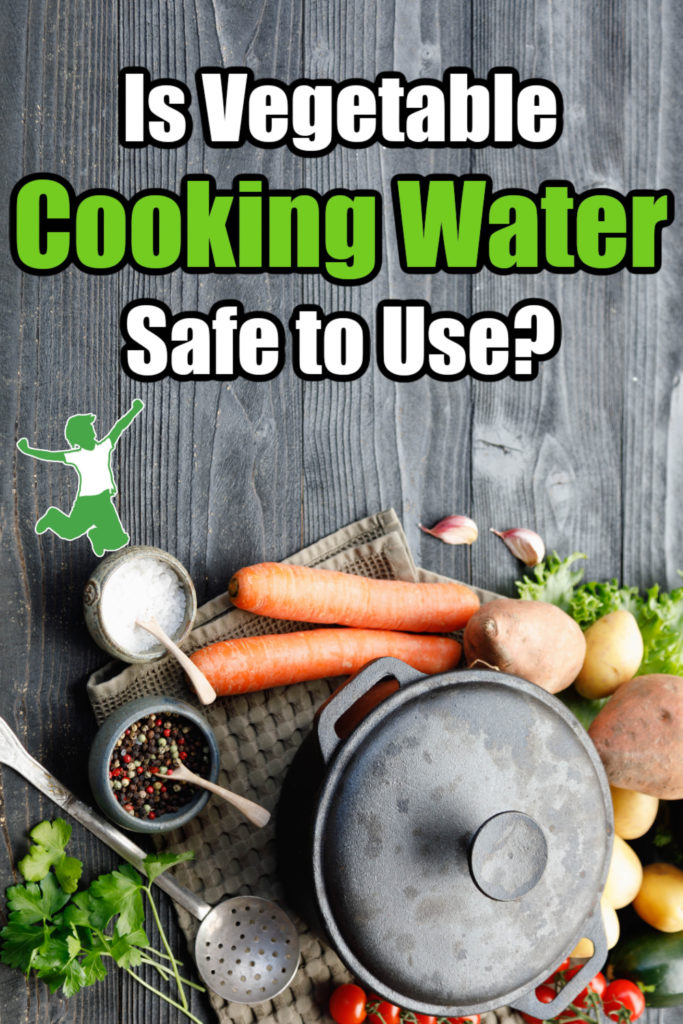Guidelines for when vegetable cooking water is safe to use and when it is best to toss due to nitrites, residues or anti-nutrients that can do more harm than good.

Adelle Davis popularized the practice of saving vegetable cooking water during the Leave it To Beaver era of the American 1950s.
She reasoned that any vitamins and minerals lost from cooking the vegetables would end up in the water.
This supposedly nutrient-rich cooking water could then be added to homemade soups or sauces with the nutrition benefiting those that consumed them.
This notion took hold and has not let go to this day.
Unfortunately, reserving vegetable cooking water can do more harm than good.
Consider the reasons below before you use it in your dishes. How to know your veggie cooking water is safe is discussed as well.
Chemical Residues
If the vegetables that are cooked are not organic, pesticides and nitrites from commercially produced fertilizers can end up in the cooking water.
Even low to no spray veggies such as asparagus would not be safe.
These crops are still typically fertilized with commercial preparations that are high in nitrites.
Anti-Nutrients
Cooking cruciferous vegetables such as broccoli, cauliflower, cabbage, Brussels sprouts, and kale would add goitrogenic (thyroid blocking) substances to the cooking water which should be discarded.
Water used to boil potatoes would contain chemicals called hemagglutinins that disrupt red blood cell formation.
Dark green, leafy vegetables such as beet greens, raw spinach, and chard contain oxalic acid that blocks calcium and iron absorption.
This irritating substance also can cause distress to the sensitive mucous membranes in the mouth and intestinal tract and contributes to the formation of kidney stones.
Consuming raw crucifers or dark, leafy greens is not an alternative either as the substances that cause problems when in the cooking water also cause problems if consumed directly with the vegetable in an uncooked state such as a raw green smoothie.
Legumes & Beans
For the last few years, the vegan community has popularized the trend of reusing legume cooking water, particularly from chickpeas.
This isn’t a safe practice even if the legumes or beans are soaked before cooking.
This soapy, slimy water is called aquafaba and is used as an egg replacement, particularly in dessert recipes. It whips up foamy just like egg whites.
Published research reveals that chickpea cooking water contains saponins, a potent anti-nutrient that contributes to leaky gut, which is at epidemic levels today.
It is also not advisable for pregnant women to consume this substance as it is a miscarriage risk.
Safe Vegetable Cooking Water
Do you really want to use vegetable cooking water as a frugal tool in your kitchen routine?
Consider this list of some of the most popular vegetables below. They are safe to use for that purpose.
- carrots
- turnips
- potatoes (peelings)
- parsnips
- beets
- celery
- organic pumpkins and squash (including zucchini)
- organic onions, leeks, and garlic
- nightshades (tomatoes, eggplant, and peppers among a few others)
For example, this potassium broth recipe uses vegetables simmered in water from the list above.
Simple Guidelines To Follow
Do you find it confusing to remember the distinctions between which organic veggies are safe to use and which are not?
Or, do you buy some veggies organic and others conventional?
If so, it is best to just adopt the practice of not using the cooking water at all.
This is particularly true if you tend to mix veggies together when cooking them.
Never Use Veggie Water for Baby Food
It is of particular importance NOT to use vegetable cooking water for use in pureeing homemade baby food.
Use pure filtered water instead, or if baby is old enough, some homemade bone broth or meat stock.
Final Caution to Consider
One final word of caution.
All vegetables tend to form nitrates after cooking and during storage. These nitrates can transform into strong carcinogens in the intestines.
Hence, it is best to avoid refrigerating and reheating vegetables, particularly leafy, green vegetables which concentrate nitrates when grown commercially.
References
Nourishing Traditions Cookbook









Leslie Delamater Anderson Aitken My Mom is 84 and never saved the vegetable cooking water for anything! LOL
Kristen Davenport Katz The readers of my blog are not the average processed food eating people. They are interested in maximizing their health and want to know and understand the nuances of traditional cooking. Using vegetable cooking water has some cautions that go along with it that the majority of my readers will appreciate understanding.
The tradition in my family is to make a broth from discarded vegetable pieces. Do you have an opinion on boiling onion and garlic papers for broth? Thanks!
Sarah,
Thank you for continuing to answer questions on this post after all this time. My question is about frozen kale, chard, and spinach. The recommendation I have always seen for freezing these veggies is to blanch them and then freeze. Once that is done, will the nitrates increase in cold storage? So my question is threefold: 1) My family typically puts the frozen kale in smoothies. Would that cause us to consume bad nitrates? 2) Would we be better off re-heating and water and then discard that water? Or 3) Is there no way to safely preserve kale by freezing it?
Thanks again!
Thanks,
Albert
I think this is one of the most irresponsible articles I have ever read. In a day and age when 95 percent of Americans are eating nothing but processed crap, here we have someone scaring the crap out of us about … vegetable stock? This is even worse than Joseph Mercola writing incessant idiocy warning us against eating fruit. Luckily you don’t have nearly the audience that Mercola has, warning us against LEAFY GREENS?? Seriously? Do just a LITTLE bit of research instead of parroting the articles warning us about oxalates and “goitrogens”. Are there ANY studies showing a correlation between eating kale or spinach and kidney stones? Are there ANY studies correlating the consumption of kale and thyroid issues? No, and no. Kale and spinach are GOOD FOR YOU, hello? Just as with any food on the planet, if you eat pounds of leafy greens every day, and nothing else, you might find yourself with some nutritional issues— a balanced diet is important— but kale and spinach have endless positive health benefits. I’m not going to disagree that we should be buying organic vegetables , but I’d way rather see someone making vegetable stock with non-organic veggies than eating, say, 90 percent of the other stuff you can buy at a basic grocery store. This article is irresponsible and it’s quite disturbing to me that I saw it posted three times on Facebook. Use your noggins, folks, and please ignore this stupidity .http://www.whfoods.com/genpage.php?tname=george&dbid=250
For a more rational look at goitrogens, try here. http://www.whfoods.com/genpage.php?tname=george&dbid=250
Some people who get too far into certain “diets” get to the point where they cannot see the forest for the trees. This article from Sarah is one of those.
I think that the best practice for using water leftover from cooking or steaming vegetables is to pour into the soil of your garden or yard. That way any nutrients in the water can go into the yard instead of down the drain.
Great info – thanks for sharing! I use my veggie water for my plants, so there is no question.
I just read that you water your plants with vegetable water. I was asking the same question on wikihow.com now I know someone else is doing it, i’ll try it in my front garden. I’ve got a lot of vegetable water.. I use the clippings from vegetables and boil in water for 45 minutes and strain. then I throw out the clippings. and wala I have vegetable water.
Almost makes you afraid to eat anymore.. I was wondering about dehydrating left over veggies for later use. I heard a lady say that she does this so as to not be wasteful. What are your thought on dehydrating left overs?
Thanks Sarah for informing us once again:)
I depends on the vegetables. Some vegetables contain high amounts of oxalic acid and the soluble portion leaches into the cooking water. Its better to throw the water out.